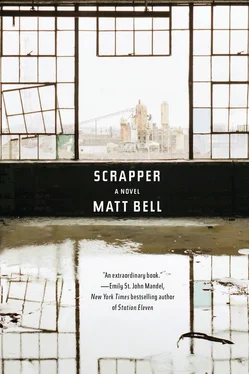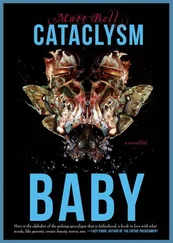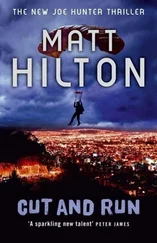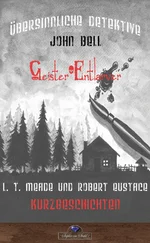Matt Bell - Scrapper
Здесь есть возможность читать онлайн «Matt Bell - Scrapper» весь текст электронной книги совершенно бесплатно (целиком полную версию без сокращений). В некоторых случаях можно слушать аудио, скачать через торрент в формате fb2 и присутствует краткое содержание. Год выпуска: 2015, Издательство: Soho Press, Жанр: Современная проза, на английском языке. Описание произведения, (предисловие) а так же отзывы посетителей доступны на портале библиотеки ЛибКат.
- Название:Scrapper
- Автор:
- Издательство:Soho Press
- Жанр:
- Год:2015
- ISBN:нет данных
- Рейтинг книги:4 / 5. Голосов: 1
-
Избранное:Добавить в избранное
- Отзывы:
-
Ваша оценка:
- 80
- 1
- 2
- 3
- 4
- 5
Scrapper: краткое содержание, описание и аннотация
Предлагаем к чтению аннотацию, описание, краткое содержание или предисловие (зависит от того, что написал сам автор книги «Scrapper»). Если вы не нашли необходимую информацию о книге — напишите в комментариях, мы постараемся отыскать её.
Scrapper
Scrapper — читать онлайн бесплатно полную книгу (весь текст) целиком
Ниже представлен текст книги, разбитый по страницам. Система сохранения места последней прочитанной страницы, позволяет с удобством читать онлайн бесплатно книгу «Scrapper», без необходимости каждый раз заново искать на чём Вы остановились. Поставьте закладку, и сможете в любой момент перейти на страницу, на которой закончили чтение.
Интервал:
Закладка:
THE LAST HOUSE IN THE northern city, the city’s last boy: always the blue house had been silent and static but that night you arrived to a movement of the air whistling through an open window, to muddy tracks on the floor, boot prints leading from the foyer to the kitchen, upstairs, and then down into the basement.
Remember the powerful wakefulness, every nerve lighting up for the reappearance of the new. You had been bored and had tried to keep yourself away so your boredom might fade and now there was this newness, arrived again, lighting you into attention.
Remember how this boy had meant nothing. How there had been no joy in the watching. How you thought perhaps someone else had watched him first, how the other had removed what you sought, the unnamable portion of a boy the watching could claim.
You took your shoes off in the foyer. You had to kneel to undo the double knot of the laces. There wasn’t anywhere to hang your coat so you carried it into the kitchen, where the stove jutted out from the counter, half dragged into the middle of the room. A window hung open, let in snow accumulating on the dirty tile. The walls were opened too, the wiring and piping roughly removed. The basement lock was busted free and the basement door was ajar and no sound came from below.
You should have fled then but you needed to see for yourself. You moved slowly down the rough wooden stairs, descending through the busted plaster and the bare studs, down into the cool damp of the underground. You had a flashlight in your pocket but you didn’t use it.
Certainly the dark had never bothered you.
There were footprints upstairs, damage to the house everywhere. An intruder had come for the plumbing and had taken something better. You had known the boy — had almost already been done knowing him — and now the boy and the intruder were somewhere else, together.
In your anger you first thought you would find the intruder, find him and bind him and watch him. But in your fear you fled until one day you awoke in a new city, in the room at the top of this yellow house, into the terror of its absolute dark, its total quiet. The room sealed so tight it stayed warmer than the rest of the house even without heat. Your mouth starched, your tongue thick between your teeth, your heart hammering above the absence of other sound. Every wet noise outside your body dulled by the soundproofing but your licking your lips loud as a scrape of sandpaper across flesh. Your pride in your accomplishment as the movement of the chair against the wood disappeared into a whisper.
There was nothing in the room but yourself and when the boys were in their rooms like this room there were only whatever sounds their bodies could make, all those trapped breaths and thumping bloods, their fickle limitations. What a gift, given to every boy you’d taken.
Outside the yellow house the midwestern winter hung, cold and blue and uninviting. In every city in the country you believed you could find a place such as this, an uninhabited zone full of empty buildings, rooms waiting to be repurposed into function. You walked the long blocks from the yellow house into the brighter parts of your new city, the busy streets where you watched and waited and looked for the right boy. The yellow house was readied for the taking and yet perhaps it would not be enough. Perhaps the intruder had changed the terms of your watching. If you made any mistake in the blue house perhaps the mistake was in the fleeing. You could have waited for the police to arrive. Did you want to hear what they would say, once they could see you? The explanations of who you were, of what you had become? The great curiosity of the why. The question you had never answered even for yourself. Your captors would have tried to see the evil in your face and they would have been disappointed. No matter how long they watched they would never see what they wanted. Because you had already looked and whatever there was inside you it was nothing you could watch no matter how brightly the light shined upon the mirror. Because it was only in a boy you could make yourself seen, only in a perfection of fear you could reveal the name you most desired being called.
KELLY FOLLOWED THE LINEBACKER into his house, a squat building of brick at the end of the neighborhood’s last occupied block. Inside, a television voiced a repetition of sports news and on either side of the set there was a dog behind bars, in a cage barely wider than its shoulders, their animal smells swamping the crowded living room. The dogs barked at the sight of the linebacker, who swore in their direction, kicking at one of the cages but absently, without malice. Kelly didn’t recognize the dogs’ breed, imagined some combination bred cheaply together, a mix of incompatible angers, canine functions.
My girlfriend’s dogs, the linebacker said. I could take them or leave them. He asked a question, had to repeat himself before Kelly answered: What kind of caliber, what kind of stopping power?
Kelly said, I would like something the sight of would make a man do anything.
The linebacker said, There are certainly guns like that but they aren’t free. Have a seat.
The linebacker returned from the second floor with a logoed duffel bag, its two zippers padlocked together. He pulled a key ring from his pocket, separated out the right key from the clump. Inside the duffel were individual objects concealed in bubble wrap, their danger sealed away. The linebacker chose three of the bundles, peeled back the masking tape across their folds, laid out the contents on the kitchen table.
Each weapon was black, unloaded. There were some differences in ornamentation, some spread of calibers, stopping power. The smallest pistol was heavier than Kelly expected but immediately he knew he wouldn’t want anything lighter. If he was going to carry a loaded gun he wanted to know it every step. If he was going to hurt someone he wanted to carry the burden of that hurt across a great distance. The act might be a surprise to the killed but he thought the killer should know its weight. He put down the smallest pistol and picked up the biggest. He couldn’t imagine doing anything but killing with it.
He asked, What would the recoil be like?
Magnificent, the linebacker said. Like holding a stallion in your fist.
The safety was on but Kelly gave the trigger a pull anyway, explored the short range of motion the safety allowed. He put the pistol down, asked how much.
The linebacker laughed. That’s it? Five minutes ago you didn’t know what you were looking at and now you know exactly what you want.
The linebacker laughed again. The sound filled the room, overflowed it. Somewhere above them a baby started crying. Kelly had forgotten there was an upstairs. He hadn’t even known about the baby. A woman’s voice could be heard comforting the child. Kelly made an awkward apology. He wanted to leave but not without the pistol, its halo of deathly want. The linebacker named a price and Kelly opened his wallet. The linebacker sealed the pistol in the bubble wrap, reaffixed the masking tape, searched the kitchen drawers for a plastic shopping bag. Upstairs the baby cried and cried. As Kelly walked out of the house the dogs kept their silence, cowed in their cages. He wanted to get down on his hands and knees and growl into their faces but the linebacker wanted him out of his house. Upstairs, the baby continued to cry and the woman’s voice lost its whispered comforts, rising harsh and frustrated as Kelly stepped out into the snow.
On the last night of the year they made love carefully, bodies angling against each other in the dark, their motions unhurried. Her cane was beside the bed, her nightstand full of muscle relaxers, creams, lubricants. It was up to him to find the proper approach, to move them through the stations of their sex, and now he did so easily, knowing what she liked best. Or else he thought he did and she let him think it. She was vocal in her desire in a way he had not previously known. He had preferred a certain roughness but this was good too. He’d never known any tenderness within himself, had only briefly approached it in the past. The way a child supposedly rewrites its parents: he’d craved this, thought he needed it. Even though the child wasn’t his own he had wanted the child to make him new.
Читать дальшеИнтервал:
Закладка:
Похожие книги на «Scrapper»
Представляем Вашему вниманию похожие книги на «Scrapper» списком для выбора. Мы отобрали схожую по названию и смыслу литературу в надежде предоставить читателям больше вариантов отыскать новые, интересные, ещё непрочитанные произведения.
Обсуждение, отзывы о книге «Scrapper» и просто собственные мнения читателей. Оставьте ваши комментарии, напишите, что Вы думаете о произведении, его смысле или главных героях. Укажите что конкретно понравилось, а что нет, и почему Вы так считаете.












